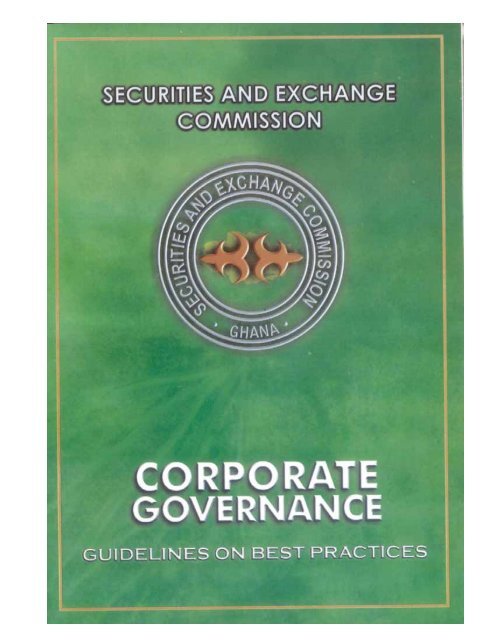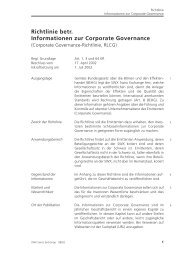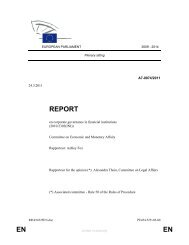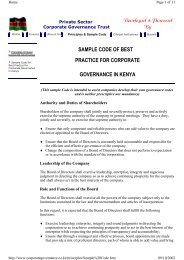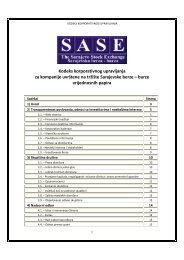English - European Corporate Governance Institute
English - European Corporate Governance Institute
English - European Corporate Governance Institute
- No tags were found...
You also want an ePaper? Increase the reach of your titles
YUMPU automatically turns print PDFs into web optimized ePapers that Google loves.
• The provision of the structure through which the objectives of the company are identified andthe monitoring of the means used to attain these objectives including the monitoring ofperformance in this regard.• Bringing more transparency to bear on the decision-making processes of the company.• The provision of proper incentives for the board and management to pursue objectives that arein the interests of the corporate body and shareholders.• Encouraging the use of resources in a more efficient manner.• The management of risk and the minimisation of the effects of commercial misadventure.<strong>Corporate</strong> governance is only part of the larger economic context in which companies operate. It isrecognised though as a key element in improving economic efficiency and is considered a powerfulmicro-policy instrument and effective lever for change in transitional economies. It is however, nosubstitute for entrepreneurial ability. It only offers a framework of accountability and checks andbalances. Further good corporate governance cannot prevent ill-conceived strategies, productfailures or missed opportunities. It can however contain the harm arising from such corporateshortcomings and enable the tackling of issues such as defective leadership, persistent poorbusiness performance and a general erosion of trust or confidence in or around businesses. In thecircumstances it could be said to contribute to the preservation, sustenance and nurturing of thefruits of entrepreneurial activity.<strong>Corporate</strong> governance is affected by a multiplicity of factors. It is affected by the relationshipsamong participants in the governance system. The legal, regulatory, and institutional environmentin which, a corporate body operates affects the manner in which it governs. In addition, factorssuch as business ethics and corporate awareness of the environmental and societal interests of thecommunities in which it operates can also have an impact on the governance of the corporate body.The Importance of <strong>Corporate</strong> <strong>Governance</strong>The subject of corporate governance commenced attracting attention at national level in moredeveloped markets in the late 1900’s. This was in the wake of some spectacular business collapses,which appeared to be largely attributable to the lack of proper corporate governance. The abovecoupled with the globalisation of economies and financial and investment markets in the 1990’slead to the convergence of national initiatives on the subject. This development was acceleratedwith the onset of the Asian crisis in mid 1997 after which the subject attracted significant attentioninternationally especially in the context of emerging markets. Whilst the causes of the crisis are stillthe subject of contention and debate there is an overall consensus that the lack of proper corporategovernance in companies operating in the affected economies contributed significantly to the onsetand spread of the contagion.In this background a concerted international effort was initiated to improve the levels of corporategovernance especially in emerging market economies. This initiative was no doubt spurred onamongst other factors by the recognition that the degree to which corporations observe basicprinciples of good corporate governance will be an increasingly important factor for investmentdecisions in the future.3
With the subject taking on international dimensions many multilateral agencies commencedencouraging governments, regulators and organisations assist and interact with, to begin examiningthe subject closely and to take proactive steps to introduce and implement proper corporategovernance procedures. To facilitate this introduction and implementation many of these agencieseither individually or collectively issued codes containing the general principles upon whichacceptable corporate governance frame-works should be based. Notably amongst these are thecodes and principles issued by organisations such as the Organisation for Economic Co-operationand Development and the Commonwealth Association for <strong>Corporate</strong> <strong>Governance</strong>.The Principles of <strong>Corporate</strong> <strong>Governance</strong>The principles advocated in these codes are essentially non-binding and embody the experience andviews of member countries of these organisations on the subject. While a multiplicity of factorsaffect the governance and decision-making processes of firms, and are important to their long-termsuccess, the principles focus primarily on governance problems that result from the separation ofownership and control.It is accepted that there is no single model of good corporate governance and that no one size fitsall. This is due to corporate governance being comprised and influenced by not only of financialand economic considerations but by social and cultural aspects as well, some of which areindigenous to the country or even sphere of application. However some identifiable commonelements that underlie good corporate governance have been discerned and the principles are builton these common elements that are intended to form the basis for further evolution anddevelopment.All though public listed companies have been in the spotlight of the corporate governanceinitiatives it is universally accepted that corporate governance is not the exclusive preserve of theprivate sector alone and that the lack of it may be more real in the government sectors of aneconomy.The principles of corporate governance cover the following areas:1. The rights of shareholders;2. The equitable treatment of shareholders;3. The role of stakeholders;4. Disclosure and transparency;5. The responsibilities of the board.The principles enunciated by the Organisation for Economic Co-operation and Development and assummary of the principles enunciated by the Commonwealth Association for <strong>Corporate</strong><strong>Governance</strong> are annexed as an Appendix to this document.4
PART II – IMPLEMENTATION OF CORPORATE GOVERNANCE PRINCIPLESImplementation in the Context of the Ghanaian Securities MarketThe Securities Industry Law, 1993 PNDLC333 vests the Securities Regulatory Commission ofGhana with the function of creating an atmosphere for the orderly growth and development of thecapital market and protecting the integrity of the market.Considering the significant contribution that that good corporate governance can make to theachievement of the above objectives, the Commission has considered it appropriate to formulateand enunciate its position on the matter. The Commission has also considered it appropriate toissue guidance notes on the manner in which taking into consideration, the state of development ofthe market in Ghana, the regulatory framework and the domestic corporate culture andcircumstance, the principles of corporate governance could be implemented in the Ghanaiancontext.In doing so the Commission has been cognisant of the fact that the shaping of an effectiveregulatory framework must be balanced by the need for sufficient flexibility to allow markets tofunction effectively and to respond to expectations of shareholders. The Commission is confidentthough that the adherence to good corporate governance practices will help improve the confidenceof investors and thereby ultimately reduce the costs of capital by inducing more stable sources offinancing. Of particular relevance in this respect is the co-relation between accepted corporategovernance practices and foreign fund flows. In view of the increasingly international character ofinvestment needed to drive the capital market in Ghana this is a feature of much significance. IfGhana is to reap the full benefits of global investment its corporate governance arrangements mustbe credible, well understood and have universal acceptance.In the circumstances it is the intention of the Commission that all listed corporate bodies andcompanies licensed by it should endeavour to adopt as far as is practically feasible, mechanismswhich will ensure the implementation of appropriate corporate governance practices in theirmanagement and operations.It is also necessary for corporate bodies especially those that are listed to regularly disclose theirdegree of compliance with acceptable corporate governance practices in a public manner.Collective Responsibility to Monitor <strong>Corporate</strong> <strong>Governance</strong>The Commission envisages the ensuring of proper corporate governance practices as a collectiveresponsibility cast upon all persons involved in the operations of a corporate body.For instance controlling shareholders, who may be individuals, family holdings, bloc alliances, orother corporations acting through a holding company or cross shareholdings, can significantlyinfluence corporate behaviour. In the same vein institutional investors are in a position to demandacceptable standards of corporate governance in the companies they invest in.5
Individual shareholders usually do not seek to exercise governance rights but can be concernedabout obtaining fair treatment from controlling shareholders and management. Creditors too canplay an important role in governance and have the potential to serve as external monitors overcorporate performance. Employees and other stakeholders play an important role in contributing tothe long-term success and performance of the corporation, while governments establish the overallinstitutional and legal framework for corporate governance.Consequently all these persons in a position to influence a corporate body should endeavour toencourage compliance with corporate governance practices. In this context there are threeimportant groupings of persons whose co-operation the Commission considers integral to achievingacceptable corporate governance practices. They are the directors and managers of a corporate bodyand its shareholders and other stakeholders and auditors.The Board of DirectorsInvestors in equity have certain property rights over which they must have control and whichshould be protected. However a corporation cannot be managed practically on a day to day basis byshareholder referendum. In the light of these realities the responsibility for corporate strategy andoperations is placed in the hands of the board of directors of the corporation and a managementteam that is selected, motivated and, when necessary, replaced by the board.In the above context the implementation of good corporate governance hinges on the competenceand integrity of the board of the body corporate.The board is required to fulfil certain key functions, including:• Reviewing and guiding corporate strategy, major plans of action, risk policy, annual budgetsand business plans; setting performance objectives; monitoring implementation and corporateperformance; and overseeing major capital expenditures, acquisitions and divestitures.• Selecting, compensating, monitoring and, when necessary, replacing key executives andoverseeing succession planning.• Reviewing key executive and board remuneration, and ensuring a formal and transparent boardnomination process.• Monitoring and managing potential conflicts of interest that may arise amongst managementboard members and shareholders.• Curtailing the misuse of corporate assets and abuse in related party transactions.• Ensuring the integrity of the corporation’s accounting and financial reporting systems.• Ensuring the credibility of the independent audit and the existence of appropriate internalcontrol systems.• Ensuring the monitoring and management of risk• Ensuring compliance with the law.• Monitoring the effectiveness of the governance practices under which the body corporateoperates and making changes as needed.• Overseeing the process of disclosure and communications.6
Independence from ManagementIn order for boards to effectively fulfil their responsibilities they must have some degree ofindependence from management. Board independence usually requires that a sufficient number ofboard members should not be employed by the company or be closely related to the company or itsmanagement through significant economic, family or other ties. It does not mean though thatshareholders are discouraged from being board members. However it does imply that a balancemust be maintained between controlling shareholders and managers and other persons withownership or proprietary interests in the company.Independent or non-executive board members can contribute significantly to the decision-makingprocesses of the board by bringing an objective view to bear on the evaluation of the performanceof the board and management in particular. In addition, they can play an important role in areaswhere the interests of management and shareholders may diverge such as executive remuneration,succession planning, changes of corporate control and the audit function.The boards of companies are encouraged to consider appointing a sufficient number of nonexecutiveboard members capable of exercising independent judgement to tasks where there is apotential for conflicts of interest as described above. Examples of such key responsibilities arefinancial reporting and executive remuneration. Whilst the ultimate responsibility for these matterlie with the board as a whole, independent non-executive board members can provide additionalassurances to market participants that their interests are being looked after.The Role of the ChairmanThe chairman as the head of the board can play a central role in ensuring the effective governanceof the corporate body and functioning of the board. The separation of the roles of the chairman andthe chief executive is advocated as a mechanism of ensuring an appropriate balance of power,increasing accountability and enhancing the capacity of the board for independent decision making.General Responsibilities of DirectorsDirectors should devote sufficient time to their responsibilities. Service on too many boards caninterfere with the performance of board members. Companies must consider whether excessiveboard service interferes with board performance and this should be a fact taken into account at thetime of nomination.Specific limitations on the size of the board of a corporate body are not advocated. However it isnecessary to emphasis the need to ensure that members of the board enjoy legitimacy andconfidence in the eyes of shareholders as regards their commitment to discharge the functions andobligations imposed on them.7
TrainingIn order to improve board practices and the performance of its members, it is useful for corporatebodies to engage in orientating new inductees to the board with the activities of the company andthe law under which it operates. This is of paramount importance especially in circumstances inwhich the directors can be held personally liable for breaches of the law. Continuing education inorder to remain abreast of relevant new laws, regulations, and changing commercial risks is alsorecommended.Access to InformationIn order to fulfil their responsibilities and to support decision making, board members should haveaccess to accurate and relevant information on a timely basis.Shareholders and StakeholdersShareholders must have the right to influence the corporate body on certain fundamental issues,such as:• The election of board members;• Changes in capital;• Amendments to the regulations of the company;• Approval of extraordinary transactions; and• Other issues as specified in corporate law and the regulations of the corporate body.Additional rights accruing to shareholders include the approval or election of auditors and theapproval of the distributions of profits.Shareholders are also entitled to secure methods of ownership registration; to convey or transfershares; and to obtain relevant corporate information on a timely and regular basis.The Commission does not advocate that shareholders or investors should follow any particularinvestment strategy. Neither does it seek to prescribe the optimal degree of investor activism.However the Commission taking into account the emerging nature of the Ghanaian stock marketand the relative lack of sophistication of domestic individual investors considers that institutionalshareholders have a responsibility to make considered use of their voting rights. This will assist inthe addition of value to their investments.AuditorsFinancial and annual reports are increasingly becoming the most extensively used methods for theconveyance and dissemination of corporate information to shareholder and investors. These reportsare a medium for disclosing not only the financial status of a company and its performance but alsoinformation pertaining to ownership, governance, business ethics and in some instances theenvironment and other public policy commitments.8
The Commission recognises that the quality of this information depends on the standards underwhich it is compiled and disclosed. Financial information should be presented in accordance withacceptable accounting standards with any deviations being disclosed. The presentation shouldfacilitate comparability. The information must also conform to the highest standards of accuracyand veracity as regards content.In this respect the auditors of a company play an important role in assuring the quality control offinancial information that is disseminated. The Commission considers the independence of auditorsand their accountability to shareholders to be crucial to the proper governance of a corporate body.PART III – REVIEW OF THE GHANAIAN REGULATORY FRAMEWORKThe Regulatory Framework and <strong>Corporate</strong> <strong>Governance</strong>The purpose of this segment of this document is to examine and ascertain the degree to which thelegal and regulatory framework prevalent in Ghana facilitates the recognition of the underlyingprinciples of corporate governance. The regulatory framework for corporate governance insofar asthe securities markets are concerned is contained in the Companies Code 1963 (Act 179), theSecurities Industry Law 1993 (PNDCL 333) and the Membership and Listing Regulations of theGhana Stock Exchange. These framework is supplemented by the Ghana National AccountingStandards and the principles and codes of professional conduct imposed by the <strong>Institute</strong> ofChartered Accountants (Ghana) on its members.1. The rights of shareholdersThe Companies Code 1963, the Securities Industry Law 1993 and the Regulations of the GhanaStock Exchange provide the primary regulatory framework for the establishment and operations ofcompanies that issue publicly traded securities. These laws and regulations provide for basicshareholder rights including the right to:(a) secure methods of ownership registration;(b) convey or transfer shares;(c) obtain relevant information on the corporation on a timely and regular basis;(d) participate and vote in general shareholder meetings;(e) elect members of the board; and(f) share in the profits of the corporation.The laws and regulations also ensure that shareholders have the right to participate in, and to besufficiently informed on, decisions concerning fundamental corporate changes such as:(a) amendments to the statutes, or articles of incorporation or similargoverning documents of the company;(b) the authorisation of additional shares;(c) variation of class rights;(d) extraordinary transactions that in effect result in the sale of the company.9
The Companies Code also makes provision for –(a) giving opportunities for shareholders to participate and vote in general shareholdermeetings;(b) shareholders to be furnished with sufficient and timely information concerning the date,location and agenda of general meetings, as well as full and timely informationregarding the issues to be decided at the meeting;(c) for shareholders to place items on the agenda at general meetings, subject to reasonablelimitations;(d) shareholders to vote in person or in absentia.The Securities Industry Law, the Take-overs and Mergers Regulations, Listing Regulations andTrading Regulations of the Ghana Stock Exchange-(a) requires equity ownership over and above specified thresholds to be disclosed;(b) ensures that the market for corporate control of listed companies functions in anefficient and transparent manner;(c) specifies the rules and procedures governing the acquisition of corporate control withthe objective of ensuring fair and equal treatment to all shareholders.The existing provisions specifically in the area of changes in corporate control in listed companieswill be further strengthened by proposed Take-over and Mergers Regulations to be issued by theSecurities Regulatory Commission2. The equitable treatment of shareholdersThe laws referred to above recognise the principle of equitable treatment of all shareholders. Nodistinction is made between foreign and domestic shareholder as regards shareholder rights underthe law except that foreign holdings in listed companies are subject to ownership thresholds basedon exchange control restrictions. Minority shareholders are afforded the opportunity of obtainingeffective redress for violation of their rights under the Companies Code and all shares issued unlessotherwise specified rank pari passu with other shares of the same class in issue and in the case ofordinary shares, one share carries one vote.The Securities Industry Law prohibits and penalises insider trading and abusive self-dealing.3. The role of stakeholders in corporate governanceStakeholder rights are established and protected under the general laws pertaining to commerce,contracts and labour.10
4. Disclosure and transparencyThe Companies Code 1963 mandates the laying of annual audited accounts of a company beforeits shareholders in general meeting. The Code specifies the minimum content of such accounts andalso the qualifications of auditors competent to report on such accounts. The Listing Regulations ofthe Ghana Stock Exchange provides the time frames within which annual reports of listedcompanies must be circulated. The standards adopted and issued by the <strong>Institute</strong> of CharteredAccountants (Ghana) provide for the quality of presentation financial information must conformto.The Listing Regulations also requires investors to be provided with information of a price sensitivenature including information on issues that materially effect the:(a) The financial and operating results of the company.(b) The objectives of the company.(c) Major share ownership and voting rights.(d) Members of the board and key executives, and their remuneration.(e) Material foreseeable risk factors.(f) Material issues regarding employees and other stakeholders.The Companies Code also requires directors to disclose any material interests in transactions orcontracts affecting the company.The Companies Code and the Listing Regulations specify the channels for dissemination ofinformation to the stock exchange, shareholders and the general public in the case of listedcompanies.The provisions for the dissemination of information will be strengthened by the proposedregulations of the Securities Regulatory Commission.5. The responsibilities of the boardThe Companies Code 1963 specifies the basic responsibilities of the board of a company. It alsomakes provision for the appointment, retirement and removal of directors and also with regard totheir qualifications. The provisions contained in the Companies Code are supplemented by theListing Regulations of the Ghana Stock Exchange, which inter alia requires all listed companies toestablish and maintain audit committees.The Commission recognises though that many aspects of good corporate governance mustnecessarily have their origin in the culture and conduct of the board of a company. Hence the bestpractices on corporate governance being identified by the Commission in this document are mainlybased on this premise.11
PART IV – CODE OF BEST PRACTICES ON CORPORATE GOVERNANCEPreambleThe Securities Regulatory Commission with a view to providing some guidance on mechanismswhich will contribute to the implementation of suitable corporate governance practices in corporatebodies licensed under the Securities Industry Law and the issuers of publicly traded securitiesparticularly those listed on stock exchanges approved under Law has formulated the followingbody of best practices. These best practices are based on principles enunciated by the Organisationfor Economic Co-operation and Development, the Commonwealth Association for <strong>Corporate</strong><strong>Governance</strong> and codes of corporate governance issued by regulatory authorities in emergingmarkets. The practices embodied in this document do not have the force of law. They are primarilyintended to be guidelines whereby the standards of governance in corporate bodies regulated by theCommission may be benchmarked. . The best practices are evolutionary in nature and should beadapted by users to suit their own particular circumstance provided the spirit of the principlesunderlying the practices is maintained.ApplicationThe Code of Best Practices on <strong>Corporate</strong> <strong>Governance</strong> will apply to all corporate bodies approved orlicensed as stock exchanges, dealers and investment advisers under the Securities Industry Law, themanagers, operators, trustees and custodian of unit trusts and mutual funds and the issuers ofpublicly traded securities.Section I – The Mission, Responsibilities and Accountability of the Board of DirectorsPrinciple Objectives1. (a) The principle objective of the board of directors of a corporate body is to ensure that thecorporate body is properly managed in order to protect and enhance shareholder value andto meet the corporate body’s obligations to:(i)(ii)(iii)shareholders;the industry in which it operates; andto the law.(b) The interests of other stakeholders are relevant as a derivative of the duty to shareholders.Primary Responsibility for <strong>Corporate</strong> <strong>Governance</strong>2. The primary responsibility for ensuring that good corporate governance prevails lies with theboard of directors of the corporate body.12
Principle Duties of the Board3. The principle duties of the board will include the:(a) the strategic guidance of the corporate body in keeping with its businessobjectives;(b) overseeing the management and conduct of the business;(c) the identification of risk and the implementation of systems that manage risk;(d) succession planning and the appointment, training, remuneration and replacementof senior management;(e) overseeing of internal control systems;(f) maintenance of the corporate body’s communications and informationdissemination policy.4. The board will be accountable to the corporate body and its shareholders.The Size of the Board5. The size of the board of every corporate body should be arrived at with a view to promotingeffectiveness and ensuring appropriate representational needs.6. No specific numbers are prescribed with regard to membership however a board of between 8 –16 members is considered ideal.Appointment7. Procedures for appointments to the board should be formal and transparent.8. Shareholders should be provided with biographical information of all new directors sought beappointed including:(a) name, age and country of principal residence;(b) whether appointment is executive and if so the specific area of responsibility;(c) working experience and occupation during the past ten years;(d) other directorships (present and for the past five years);(e) shareholding in the corporate body and its subsidiaries;(f) family relationship with any director and/or substantial shareholder of thecorporate body or its principal subsidiaries;(g) any conflict of interest;13
Orientation9. New directors should be formally orientated with and informed of the corporate body’sbusiness, competitive posture and strategic plans and objectives.10. Directors should also be apprised and informed of the relevant laws, regulations and rules thatgovern the operations of the body corporate and the responsibilities and obligations placed ondirectors by such laws, regulations and rules.Training11. Directors should be subject to ongoing training not only in their particular field of expertise butalso in other areas which will assist them in the discharge of their duties and functions.Multiple Board Seats12. It is not intended to place any limitations on the number of other directorships a director of acorporate body should hold.13. However in assessing suitability for appointment consideration should be given to the externalobligations of nominees vis-à-vis the time they can devote as director of the corporate body towhich they seek appointment.Separation between Chairman and Managing Director/ CEO14. There should ideally be a separation between the role of chairman and managing director/chiefexecutive officer particularly in listed companies unless there are specific reason which militateagainst such separation or as may be in the case of smaller corporate bodies, the cost ofseparation is uneconomical.15. If the two offices are combined in the case of corporate bodies having their securities listed on astock exchange the rationalisation behind the decision to combine the roles should be explainedto shareholders and the board must enact procedures that ensure the independence of the boardas a whole.16. In the event of a separation of the two offices the relationship between the managingdirector/chief executive office and the chairman and board as a whole along with theirrespective responsibilities should be formally defined.The Chairman17. The chairman’s plays a crucial role in securing good corporate governance.18. The chairman should ensure that the board is in complete control of the corporate body’s affairsand fully alert to the obligations to shareholders, industry and the law.14
19. As regards the functioning of the board the chairman is expected to -(a) ensure that the board meets regularly and that meetings of the board are conductedin a proper manner;(b) ascertain the views and/or the decision of the meeting on the issues being discussed;(c) ensure that directors, are encouraged to contribute within their respectivecapabilities in order to secure the maximum benefit for the corporate body;(d) be responsible for the directors receipt of qualitative and quantitative information;(e) ensure that any non-executive director who is not contributing to the deliberations ofthe board is either not re-elected or requested to resign or is removed.20. The chairman should ensure that the board develops and implements a process for assessing theeffectiveness of the board, committees of the board and the contributions of individualdirectors.Composition21. The board should include a balance of executive and non-executive directors with thecomplement of independent non-executive directors being at least one third of the totalmembership of the board and in any event not less than two.Appointment and Qualifications of Non-executive Directors22. The appointment of non-executive directors should ordinarily be a matter for the board as awhole and the selection process should be based on merit.23. For the purposes of this code a director would be deemed to be independent if he –(a) is not a substantial shareholder of the corporate body;(b) has not been employed by the corporate body in an executive capacity for theprevious there years;(c) is not a professional adviser or consultant to the corporate body;(d) is not a significant supplier or customer;(e) has no significant contractual relationship with the corporate body; and(f) is free from any other relationship with the corporate body, which may interferewith an his capacity to act in an independent manner.24. Non-executive directors should not accept their appointments if they are of the view that theycannot provide the corporate body with the time and attention necessary to discharge the dutiesof office.25. Non-executive directors should be persons possessed of the necessary skill and experience tobring an independent judgement to bear on the issues of strategy, performance and resourcesincluding key appointments and standards of conduct.15
26. Non executive directors are encouraged to limit the number of other boards on which they servetaking into account potential board attendance and their ability to effectively participate in andcontribute to the work and deliberations of these boards.27. Non-executive directors should also advise the chairman and board secretary in advance of theiracceptance of an invitation to serve on another board.28. Non-executive directors should provide independent viewpoints and assistance to executivedirectors.Finance Director29. The finance function of the corporate should be made the responsibility of a specific director ofthe board.Term and Age Limits30. All directors should submit themselves for re-election at regular intervals and at least once inevery three years.31. All directors must be subject to the age restrictions specified in the Companies Code 1963 orthe statute under which the corporation was incorporated or its internal regulations.Access to Information32. All directors should have unrestricted access to all company information, records anddocuments.33. The board should formulate a policy whereby directors can within reason enjoy the right toretain outside professional experts for counsel.Board Committee Meetings34. The board should meet regularly and in the case of listed corporate bodies at least six times ayear.35. Committees of the board should meet as periodically as is required to properly discharge theirfunctions.36. Attendance of directors (especially non-executive directors) at these meetings should be a keyelement in their continued service on the board.37. Due notice should be given of issues to be discussed.38. The company secretary should properly maintain records of meetings and conclusions reached.16
39. Contrary or dissenting views should be clearly disclosed in the minutes of meetings.Company Secretary40. The company secretary should be qualified company secretary as required under the CompaniesCode 1963.41. The company secretary should be a source of advice and guidance to the chairman and board onthe implementation of appropriate corporate governance practices insofar as the workings of theboard are concerned.Section II – Committees of the BoardCommittees in General42. The board should constitute such committees, as it may deem appropriate to assist it in thedischarge of its functions and responsibilities.43. The composition of these committees may include persons other than directors provided thatthe responsibility for any decisions or recommendations made shall lie only with the directorsof the corporate body who are members of the committee.44. The terms of reference, scope of functions and limits of authority of committees of boardshould be clearly delineated in writing.45. The committees of the board and the membership of these committees should be disclosed inthe annual report issued by the corporate body.Audit Committee46. Every corporate body at whom this Code is directed should establish an audit committee.Composition of the Audit Committee47. The audit committee should comprise at least three directors, the majority of whom should benon-executive.48. The membership of the audit committees should ideally comprise directors with an adequateknowledge of finance, accounts and the basic element of the laws under which the corporatebody operates or is subject to.49. The chairman of the committee should be a non-executive director.17
50. The managing director/chief executive officer, the finance director, the head of internal auditand a representative of the external auditors should ordinarily be invited to attend meetings.Functions of the Audit Committee51. The primary functions of the audit committee will be to –(a) recommend the appointment of the external auditors of the corporate body;(b) liase with the external auditors for the purposes of maintaining and ensuring auditquality, effectiveness, risk assessment, interaction with internal auditors and dealingwith situations governing the resignation of the external auditors(c) review with the auditors their report on the financial statements of the corporate body;(d) review the adequacy of systems of internal controls and of the degree of compliancewith material policies, laws and the code of ethics and business practices of thecorporate body;(e) provide a direct channel of communication between the board and the external andinternal auditors of the corporate body, accountants and compliance officers (if any)of the corporate body;(f) to report to the board on all issues of significant extraordinary financial transactions;(g) to assist the board in developing policies that would enhance the controls andoperating systems of the corporate body.Authority of the Audit Committee52. The audit committee should:(a) have the authority to investigate any matter under its terms of reference;(b) be provided with the resources it needs to carry out such investigation; and(c) be given full access to necessary information.53. The committee should with the permission of the board be in apposition to obtain externalprofessional advice if and when the need arises.Report on Activities of the Audit Committee54. Every listed company should report the establishment of its audit committee in its annualreports if it has not done so already.55. The audit committee should perform an annual review of the corporate body’s internal controlover financial, operational and compliance matters and report on the same to shareholders in theannual report of the corporate body.18
Remuneration Committee56. Every corporate body at whom this Code is directed should establish a remunerationcommittee.Composition of the Remuneration Committee57. The remuneration committee should comprise of a majority of non-executive directors.58. Executive directors who are members of the committee should exclude themselves fromdeliberations concerning their own remuneration.Functions of the Remuneration Committee59. The primary functions of the remuneration committee will be-(a) establishing a formal and transparent procedure for developing policy on executiveremuneration;(b) ensuring that a proper system of long term and short term compensation is in place toprovide performance orientated incentives to management;(c) scrutinising executive service contracts with a view to ascertaining any inordinatelosses the corporate body may be liable to incur in the event of an early terminationof services.Reporting on the Remuneration Committee60. The membership of the remuneration committee and remuneration policy should be disclosed toshareholders in the annual report. Such report should contain at least the aggregate amount offees, basic salaries, allowances, benefits in kind, contribution to pension schemes, bonuses paidand compensation paid for loss of office to directors and executive officers in the financial yearto which the report pertains.Remuneration Policy61. Levels of remuneration in corporate bodies should be competitive taking into account industrypractices.62. Remuneration should focus on retaining management and be linked as far as possible tocorporate and individual performance.63. Stock options, employee share ownership schemes and other equity oriented plans should beconsidered as a means of linking management’s interest to that of shareholders.19
Remuneration of Executive and Non-executive Directors64. Remuneration levels of directors should reflect experience and the level of responsibilitiesundertaken by the particular director concerned.65. The board as a whole should determine the remuneration of non-executive directors with theindividuals concerned excluding themselves from deliberations on the matter.66. The remuneration of non-executive directors should be fixed at a level that will ensure theircommitment to the duties and obligations they are required to discharge.Section III – Relationship to Shareholders and StakeholdersShareholders and Stakeholders67. <strong>Corporate</strong> governance practices implemented by the board should not be aimed at benefitingstakeholders at the expense of shareholders but should endeavour to increase shareholder valueby monitoring and maintaining stakeholder relationships effectively and professionally.Communications Policy68. The board must adopt and implement a communications policy that enables management tocommunicate, interact with and disseminate information regarding the direction, operations andmanagement of the corporate body to shareholders, stakeholders and the general public.69. In the case of listed corporate bodies the policy with regard to shareholders and the generalpublic must be governed by the concept of timely and continuous disclosure.70. All shareholders should have equal access to corporate information.Quality of Information Communicated71. Communications and reports by the board to shareholders and other stakeholders must be inplain language, understandable and consistent with previous reports.72. The information must be based on the principles of fairness, promptness, relevance andopenness with substance taking precedence over form.73. The highest level of disclosure should be aspired to within competitive constraints.74. Reports supported by figures should endeavour to strike a balance between the positive andnegative aspects of the activities of the corporate body for the period or event under review.20
Information on Non-Financial Affairs75. <strong>Corporate</strong> bodies are encouraged to include information on their non-financial affairs as well, insuch reports.76. Such information can include information on employment; environmental matters; socialresponsibility; and matters of customer and supplier interest.Meetings of Members77. The board should use the annual general meeting of the corporate body as the primary means ofmeeting and interacting with shareholders.78. The board of the corporate body should facilitate the creation of an environment in which:(a) General meetings are held with adequate notice and at a time and place which willfacilitate maximum attendance of shareholders;(b) Adequate notice and information is given of matters to be discussed anddeliberated;(c) Shareholders are given the opportunity within the ambit of the law and theregulations of the corporate body to place matters on the agenda of such generalmeetings.79. The board should ensure that:(a) That all shareholders are given equal access to corporate information;(b) Disparate issues are not bundled and presented for single vote;80. Opportunities of voting by mail and other means should be supported.81. The chairmen of board committees should be present at general meetings of the corporate bodyto respond to shareholder queries and questions.Section IV – Financial Affairs and AuditingFinancial <strong>Governance</strong>82. The board of the corporate body is responsible for -(a) maintaining adequate records for safeguarding the assets of the corporate body;(b) ensuring that that statutory payments payable by the corporate body are met in atimely manner;(c) ensuring that appropriate systems of internal control are in place for monitoringrisk, adherence to financial governance measures and compliance with the law;21
Financial Reporting(d) ensuring that the financial statements of the corporate body are audited at suchfrequent intervals as specified by the law, regulations or internal policies of thecorporate body by competent and qualified auditors.83. The board is responsible for:(a) the accuracy of information contained in financial statements;(b) ensuring that suitable accounting policies have been consistently applied in thepreparation of financial statements;(c) ensuring that annual financial statements of the corporate body are presented inaccordance with the Ghana National Accounting Standards and other theaccounting standards and principles issued by the <strong>Institute</strong> of CharteredAccountants of Ghana and for disclosing any deviations from the saidstandards;(d) ensuring that annual and interim financial statements of the corporate body arecirculated to shareholders and regulators within the time frames specified bylaw and regulation;(e) ensuring that annual and interim financial statements are prepared on a basisthat facilitates comparability;(f) ensuring that the auditor’s reports on the financial statements are faithfullyreproduced to the users of such statements;(g) ensuring that a balanced and understandable assessment is given of the financialand operating results of the corporate body in the financial statements.Disclosure of Price Sensitive Information84. The board of directors of a listed corporate body is responsible in the case of a listed companyfor:(a) disseminating price sensitive information to the market and shareholders in atimely manner;(b) requesting a temporary suspension in the securities of the corporate body wherea disclosure may cause untoward price movements in the market for thesecurities of the corporate body.Role of the External Auditor85. The external auditor should be the primary source of an objective, independent and effectiveopinion on the financial statements of the corporate body.86. In order to achieve the above the auditor must employ diligence, objectivity and independencein the discharge of his duties and functions.22
Duties of the Auditor87. The external auditor is responsible for ensuring that the audit of the corporate body isconducted in accordance with the generally accepted standards of auditing required by the<strong>Institute</strong> of Chartered Accountants (Ghana) of its members.Audit Report88. The external auditor should be required to specify in his report if the financial statementsaudited have been prepared in accordance with the Ghana National Accounting Standards.Departures or Deviations from Standards89. The external auditors report on the financial statements of the corporate body must specify anydeparture from the accounting standards and should contain the auditors opinion as to whetheror not the auditor acquiesces with the departure and the reasons given for such departure.90. The external auditor’s report must also specify any departure or deviation from the auditingstandards on his part and the reasons for the same.Rotation of Audit Personnel91. To ensure the continued effectiveness of the audit, personnel including the audit partner shouldbe regularly rotated or changed to enhance fresh approaches to audit work.Removal or Resignation of an Auditor92. An auditor’s removal, resignation or refusal to stand for re-election should be accompanies byan explanation, which the corporate body should circulate to all shareholders.Section V – Disclosures in Annual ReportsGeneral93. The disclosures recommended in this part are supplementary to those mandated by any law orregulation or under any other section of this Code.Chairman’s Statement94. The Chairman’s statement in the annual report should provide a balanced and readablesummary of the corporate body’s performance for the period under review and future prospectsand should reflect the collective view of the board.95. Material foreseeable risk factors should also be dealt with in such report.23
Statement of Responsibility for Financial Statements96. The annual report should include a statement from the board accepting responsibility for theinformation contained in the report and the financial statements annexed thereto.Statement as to Adequacy of Internal Controls97. The annual report should contain a statement from the board as to the adequacy of the internalcontrol mechanisms and procedures of the corporate body.Statement as to Degree of Compliance with the Law98. The annual report should contain a statement from the board as to the degree of compliance ofthe corporate body with any regulatory and other legal requirements governing its operationsand the extent to which statutory payments have been met in respect of the period under review.Statement as to Degree of Compliance with <strong>Corporate</strong> <strong>Governance</strong> Practices99. The annual report should contain a statement from the board as to the corporate body’s degreeof compliance with the corporate governance practices specified in this Code.Statement as to the Enterprise being a Going Concern100. The annual report should contain a statement from the board indicating that the board issatisfied that the corporate body is a going concern.Other Matters to be disclosed101. The board should also ensure that information is disclosed on the following matters in theannual report insofar as they are relevant to the period under review –(a) all management fees paid by the corporate body with details of the names of the partiesand their relationship to the corporate body;(b) the identities and percentage holdings of substantial shareholders;(c) significant cross shareholding relationships;(d) related party transactions;(e) details of incentive schemes, such as stock option schemes;(f) the fees paid to the auditors of the corporate body for audit and non-audit related work;and(g) any other material issues concerning employees and other stakeholders such ascreditors and suppliers.24
Section VI – Code of EthicsThe Requirement of a Code of Ethics102. Every corporate body to which this Code is directed should have its own code of ethics andstatement of business practices, which should be implemented as part of the corporategovernance practices of the corporate body.Responsibility for Formulation103. The board will be responsible for formulating this document the contents of which will beapplicable to the board and all employees.Monitoring Adherence104. The board will also be responsible for introducing a system that will monitor adherence anddiscipline breaches or deviations.Matters pertaining to the Development of the Code of Ethics105. The document should –(a) commit the corporate body to the highest standards of professional behaviour andbusiness conduct;(b) be developed in association with management and employees;(c) receive total commitment in respect of its implementation from the board and themanaging director/chief executive officer of the corporate body;(d) be sufficiently detailed as to give clear guidance to users;(e) be formally communicated to the persons to whom it applies;(f) be reviewed regularly and updated when necessary.Section VII – Glossary106. In this Code the unless the context otherwise indicates the following words shallhave the following meanings –“Body corporate” includes a company incorporated under the Companies Code 1963 or any otherstatute, domestic or foreign and includes a body incorporated under the Incorporated PrivatePartnerships Act 1962.“Board” shall mean the board of directors or managers or governing council of a body corporate“Director” shall mean any member of the board or governing council of a body corporate.25
“Executive” in relation to a body corporate shall mean any person by whatever title known who isconcerned or takes part in the management of the body corporate whether or not he is a director ofthe body corporate.“Substantial Shareholder” shall mean a share holder entitled to exercise or control the exercise of30% or more of the voting power at general meetings of the corporate body or one who is in aposition to control the composition of a majority of the board of the corporate body.PART V – CONCLUDING REMARKS AND ISSUES FOR THE FUTUREImplementing <strong>Corporate</strong> <strong>Governance</strong>The Securities Regulatory Commission is aware that corporate governance being a matterconcerning the internal operations of a body corporate would not lend itself to convenient oreffective external regulation. Audit committees, remuneration committees, independent boards andnon-executive directors do not guarantee good corporate governance. They are only structures,processes and mechanisms, which must be properly implemented if corporate governance is to beachieved. Whilst not ruling out the possibility of certain aspects, and external manifestations ofgood corporate governance practices being mandated by law or regulations in the future theCommission views the implementation of good corporate governance practices in the Ghanaiansecurities market as principally a market and industry led initiative.MotivationThe major motivating factor for the industry to embrace the concept is the benefits that can accrueto the body corporate as a whole, its managers, shareholder and other stake holders by adherenceto commonly accepted corporate governance principles.Objectives for the FutureIn furtherance of this, the Commission using this document as a foundation will be seeking toinitiate dialogue on the matter with the Ghana Stock Exchange and its members, listed companies,the Directors <strong>Institute</strong>, the <strong>Institute</strong> of Chartered Accountants of Ghana, trade chambers and other,professional organisations and institutions including multi-lateral agencies willing to fund thedevelopment of the concept.The objectives of the Commission with regard to facilitating the implementation of corporategovernance standards will focus on;i. Familiarising corporate decision-makers and board members of listed companieswith the concept and the need for corporate governance on the basis of the value itcould add to their respective companies.ii.Exploring the possibilities of providing technical assistance to companies throughforeign aid donors on the manner in which, taking into account domestic26
circumstances, the structure, framework and procedures for the working of theexternal manifestations of corporate governance such as audit committees could beestablished and operated.iii.iv.Assisting in the education of directors, both present and future, in the concept toensure its practical implementation.Educating investors and shareholders on the concept of corporate governance andthe value it could add to their investment in an effort to encourage greater investorand stake holders insistence on adherence to corporate governance practices.v. Further developing and improving this Code of Best Practices.Dr. Charles AsembriDirector GeneralSecurities Regulatory Commission27


